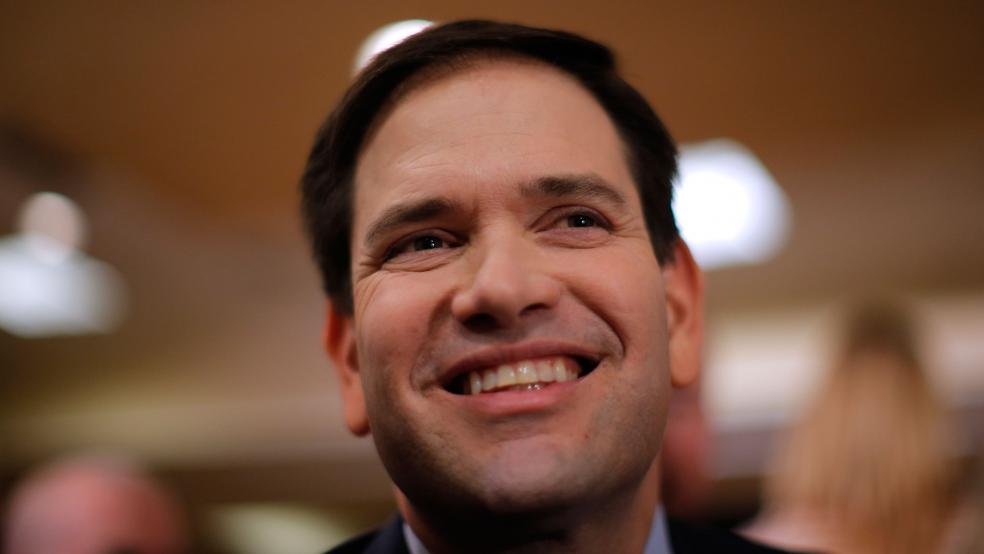Republican House Speaker Paul Ryan may have washed his hands of his party’s nominee for president, but one of Donald Trump’s leading rivals for the GOP nomination, Senator Marco Rubio of Florida, is still holding hands with him.
Reaffirming his support for Trump in a statement on Tuesday, Rubio said: “I disagree with him on many things, but I disagree with his opponent on virtually everything. I wish we had better choices for President. But I do not want Hillary Clinton to be our next President.”
Related: Election 2016: Will It All Be About Florida Again?
During the primaries, Trump’s schoolboy taunting of the not-so-tall Rubio as “Little Marco” and Rubio’s sly jab that Donald’s little hands might suggest smallness elsewhere led to one of the most incredible moments in this off-the-charts campaign: a candidate for the highest office in the land declaring publicly that he didn’t have problem below the belt.
But Rubio and Trump need each other now.
If there is any remaining path to a Trump victory in November, he almost certainly must win Florida. By Real Clear Politics’ calculations, Trump today would get 165 electoral votes to 260 for Clinton, with 113 tossups. Trump would need to win almost all of the tossups to reach the magic number of 270 Electoral College votes, but the math doesn’t work without Florida.
The data crunchers at website FiveThirtyEight say that Florida’s chances of being the “tipping-point state” – the one that is decisive in the Electoral College vote – are the highest at 17.4 percent.
Clinton has pulled ahead of Trump in Florida, with the Real Clear Politics poll average giving her a 2.4-point lead in a four-way race with Trump (42.7 percent of the vote), Libertarian Gary Johnson (4.7 percent) and Green Party candidate Jill Stein (2.1 percent).
Even before The Washington Post released the bombshell video of Trump crudely joking with then-Access Hollywood host Billy Bush about how he comes on to women, the man who would be Tweeter-in-Chief had been busy on social media further alienating Hispanics with early-morning attacks on the Venezuela-born former Miss Universe Alicia Machado, whom Clinton trotted out at the Sept. 26 debate as an example of Trump’s misogynist behavior.
Trump’s 3 a.m. Twitter blitz about the woman he once called “Miss Piggy” and “Miss Housekeeping” (a reference to her Latina ancestry) was bad enough, but then came a Newsweek story about his business dealings in Cuba while Fidel Castro was in power. While the money involved was modest -- a minimum of $68,000 – any amount may be too much for older members of the Cuban community in South Florida.
Meantime, after a late decision to seek re-election, Rubio has a 4.8-point lead over Democrat Patrick Murphy. In fact, Murphy was weakening so fast last week that the Democratic Senate Campaign Committee cancelled almost $2 million worth of planned TV ad spending. Still, if Rubio turns his back on the Republican presidential nominee, he could turn off hardcore Trump supporters.
Susan MacManus, distinguished professor of political science at the University of South Florida and a lifelong student of the state’s politics, says that Florida remains “a margin-of-error race.” And Trump, arguably, needs Rubio more than vice versa. Even lukewarm support from Rubio, who hasn’t campaigned with Trump in about a dozen visits to the state, could be crucial with the NPA (no party affiliation) Millennials and Hispanics to whom the senator appeals.
And MacManus sees the Florida race as much tighter than it appears in the polls.
Related: Trump Is Going Down Hard as Educated White Women Reject Him
Since those who saw the first debate as a clear victory for Hillary outnumbered those who called it for Trump by more than two to one – including 27 percent of Republicans – she said you would expect Clinton’s edge to be higher.
And while hardcore Cuban-American opponents of Castro might not have been pleased that Trump did business with the regime, MacManus wonders whether that is worse in their eyes than normalizing relations, as President Obama has done.
Mostly, MacManus says, with Florida almost evenly divided between registered Republicans at 36 percent of voters and registered Democrats at 38 percent, “It’s going to be a turnout game, 100 percent.”
One of the big unknowns is newly registered Republicans, many of them may have been energized by Trump. The big spike was right before the presidential primary in March, which Trump won by 45.7 percent. Republicans have added 294,282 voters since 2015, according to the Florida Division of Elections; Democrats have added 213,094 over the same period.
MacManus says Trump has brought in blue-collar, working-class whites who are largely “sometimes” voters. “If they vote, he’s got a shot. If they don’t, he doesn’t,” she says.
What could work against Trump is a significant swing vote within this swing state that goes beyond independents. MacManus says that in all her years as an observer of Florida politics she has never seen such softness in traditional bases.
A hardcore Republican woman told MacManus recently: “It’s too bad, Trump would have been a good president, but he just can stay focused.”
Related: Republicans Dumping Trump Say They Care About Women. Let Them Prove It
“Trump never really has understood the power of the women’s vote,” MacManus said in a phone interview with The Fiscal Times. “It’s not a cohesive vote. Certainly not, even though some people think it is. When you’re talking about margins, it’s the suburban women with children who can push it in one direction or another in our state.”
And we’re talking about margins. In 2012, President Obama beat Mitt Romney by just over 0.9 percent in Florida.
In the wake of “Gropegate,” Trump has to worry about those suburban women voters and older, religious females even more, says MacManus. They could grab any chance of success in Florida from his hands.





